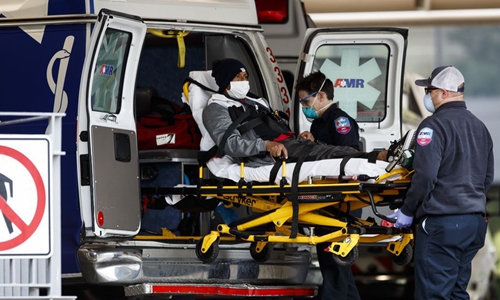Studies show 15 pct of severe COVID-19 cases linked to inborn errors: Italy's CNR
Source: Xinhua Published: 2020/9/26 12:04:58

Medical workers carry a patient from an ambulance to George Washington University Hospital in Washington D.C., the United States, on April 27, 2020. Photo:Xinhua
Two new international studies have shown that inborn errors and immunological anomalies might play a role in 15 percent of the most serious cases of COVID-19 infection, Italy's National Research Institute (CNR) said Friday in a statement.
The results were unveiled in two articles published in the scientific journal Science.
"The two studies detected high levels of antibodies directed against the Type 1 IFN (interferon) -- which is a powerful antiviral molecule -- in the blood of individuals with severe forms," the CNR explained.
"Among these, there were also patients with a rare genetic disease, the Incontinentia Pigmenti," it added.
These findings could enable people at risk of developing the severe disease to be screened and patients to be treated in a targeted manner, the institute suggested.
The international research team behind the two studies was led by Jean-Laurent Casanova (the Rockefeller University in New York and Institute Imagine/Necker-Enfants Malades in Paris) and Helen Su (National Institute of Allergy and Infectious Diseases, United States).
Italian scientists Francesca Fusco and Matilde Valeria Ursini from the Institute of Genetics and Biophysics of the CNR in Naples were part of the team.
"The first article published in Science describes the genetic anomalies in patients with severe forms of COVID-19 at the level of 13 genes, which are already known for governing the immune response controlled by Type 1 IFN against the flu virus," Fusco explained.
She added that, regardless of their age, people with these genetic variations were more at risk of developing a very severe form of COVID-19.
"An early use of Type 1 IFN in these patients could be a therapeutic option; these drugs have been available for over 30 years, and without evident side effects if taken for a short time," Fusco said.
In the second study published in Science, researchers detected the presence of high levels of antibodies directed against Type 1 IFN in more than 10 percent of coronavirus patients who developed severe pneumonia.
"These autoantibodies (antibodies that erroneously target a person's own tissues or organs) are absent in people who develop a mild form of the disease, and are rare in the overall population," CNR's Ursini specified.
The second article in the Science journal also allowed to understand the incidence of the severe form of COVID-19 in men, in people aged over 65, as well as "in a woman suffering from Incontinentia Pigmenti, a rare genetic disorder caused by a mutation in the NEMO gene located on the X chromosome."
Such data would suggest the production of these autoantibodies was linked to this chromosome, according to the CNR.
"The two publications, therefore, highlight the crucial role of Type I IFNs in the immune response against SARS-CoV-2," Ursini concluded, referring to the novel coronavirus that causes COVID-19.
The two Science articles were the first results published by the COVID Human Genetic Effort, an ongoing international project covering over 50 sequencing centers and hundreds of hospitals and research institutes around the world.
The global consortium was set up with the aim of identifying the genetic and immunological factors that could explain the occurrence of severe forms of COVID-19.
Beside the CNR, the two international studies also involved Italian researchers from the MetabERN Center for Rare Diseases-University of Milan Bicocca, and from research departments of the San Gerardo Hospital in Monza, the Spedali Civili and the University in Brescia, and the Tor Vergata University in Rome.
Posted in: CROSS-BORDERS